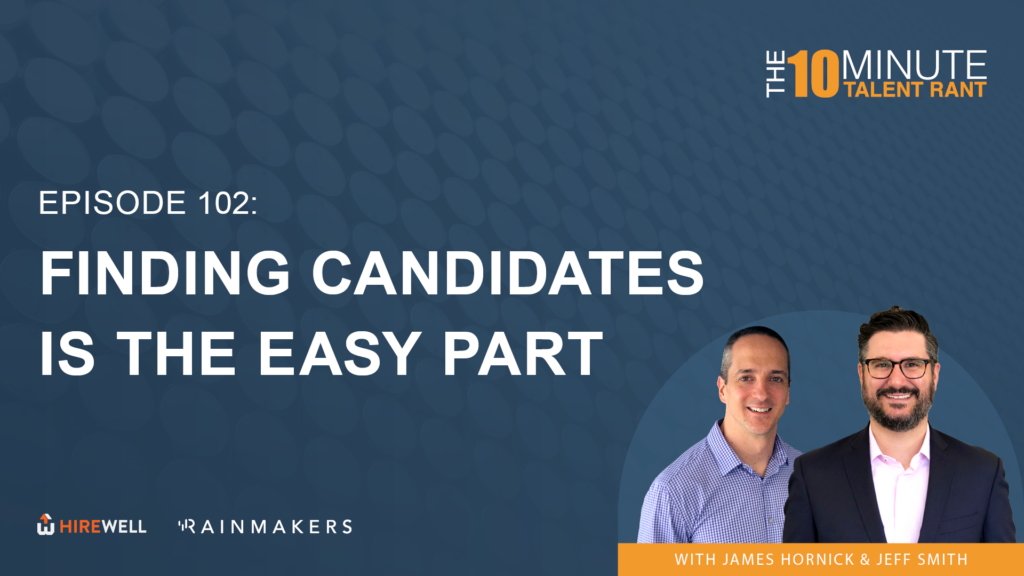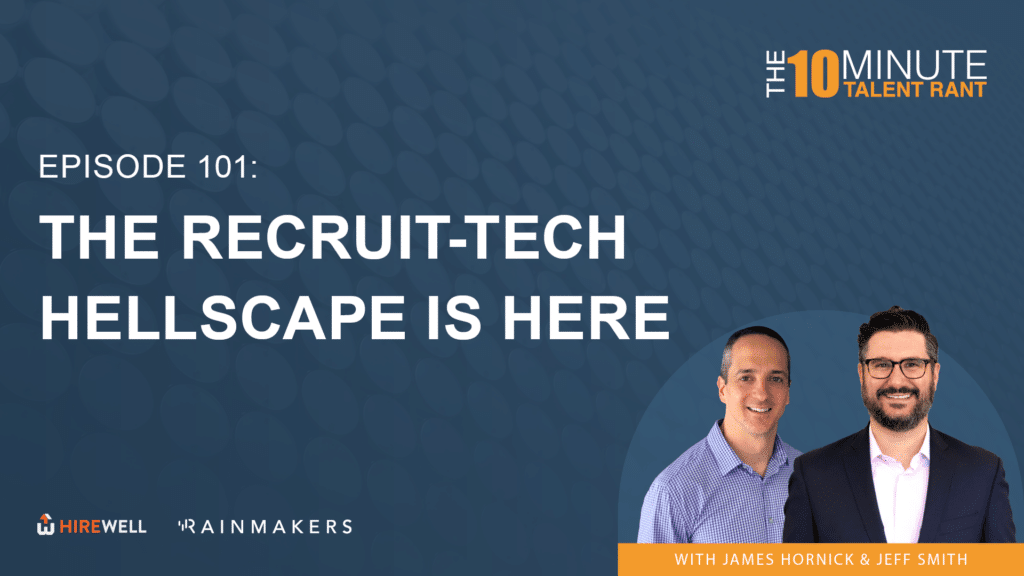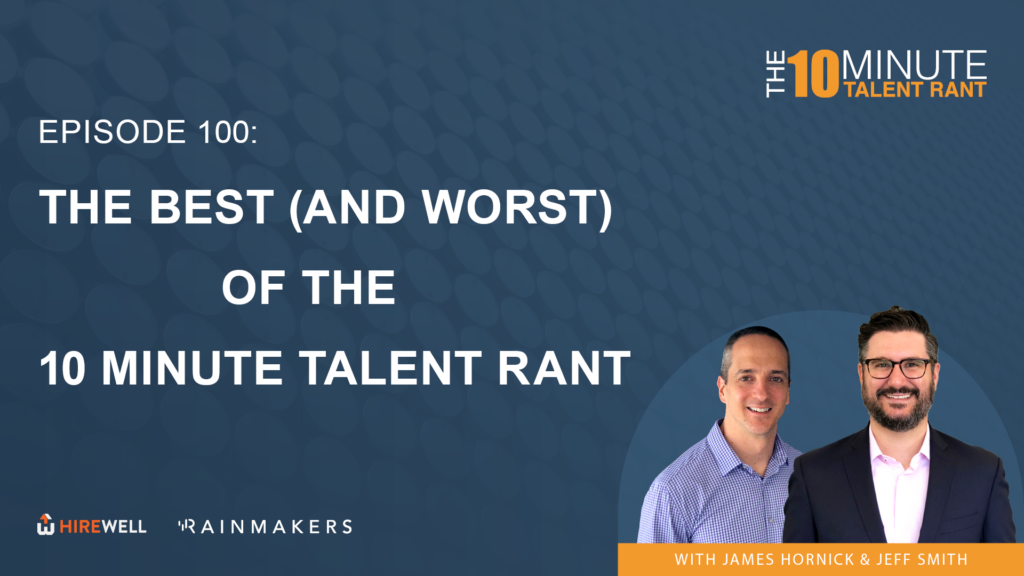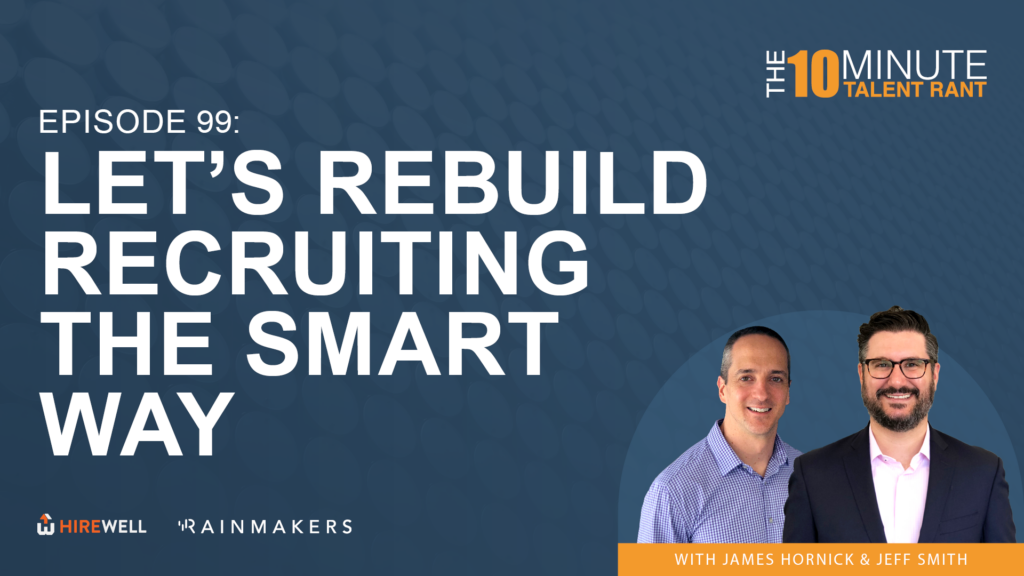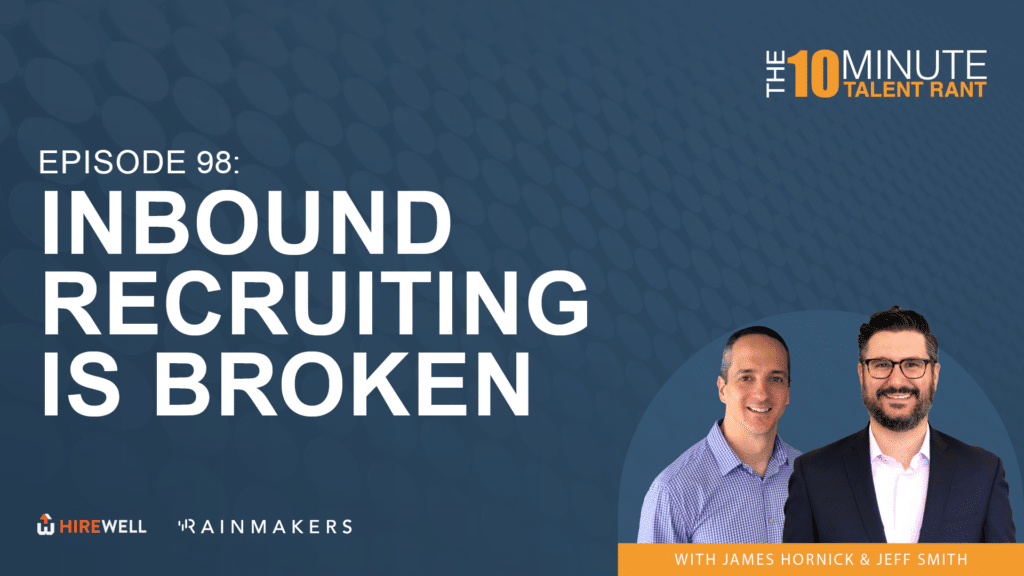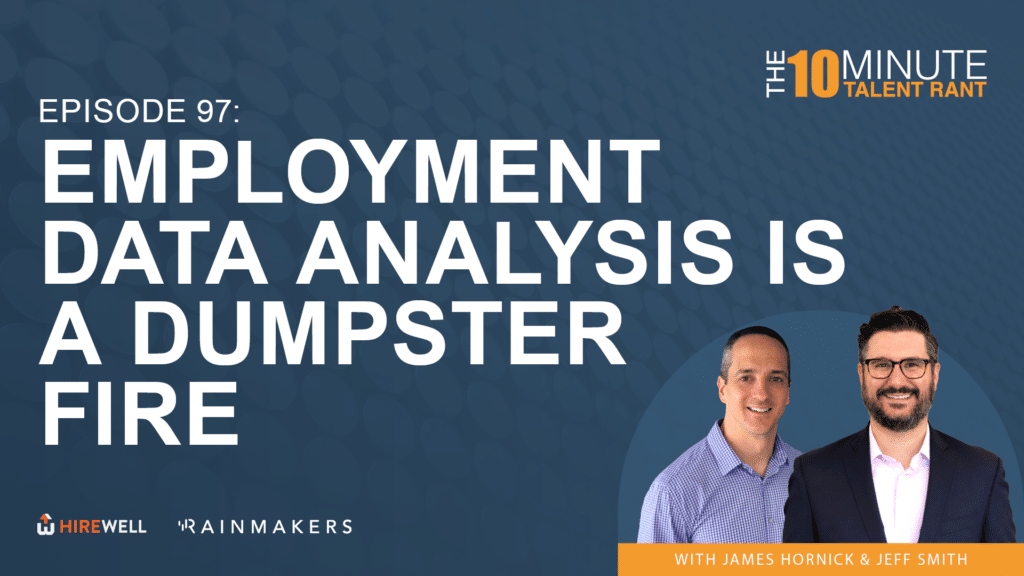The 10 Minute Talent Rant is live. I’m James Hornick joined by Jeff Smith and we are on the clock. The 10 Minute Talent Rant is our ongoing series where we break down things that are broken in the talent acquisition and hiring space. Maybe even pitch a solution or two. Before we dig, in all of our content can be found on talentinsights.hirewell.com. Jeff, are you ready? I am. This should be a jolly rant because we’re both headed out on some vacations near term. A little PTO time. We’re loose. We’re ready to talk about things. So yeah. I’ve got another one of my short stories published this week. Congrats. Riding high. Anyways. Episode 95, who’s going to screen all these candidates?
So some backstory here. I talked about this a little bit on LinkedIn, maybe as a week or two back. But one of our clients recently had high level leadership role, finance and accounting search, like VP level, C level, depending on the size of organizations, this person’s kind of coming out of. And they got 800 inbound candidates.
Actually on LinkedIn, I said it was 600. I actually got the number wrong. It was actually 800. So even more than I realized. Which was a preposterous number in and out. I know, like it seemed ridiculous enough. Now my first reaction, going back in time when my colleague told me this, I’m like, I just assumed that it got thrown out somewhere on some job board and like it just got a bunch of randos that had nothing to do, a bunch of YOLO applies. But the actual people who fit were probably, or actually were good and relatively close were a pretty small number.
No. After the first kind of pass, there were over 400 that were like reasonably close, meaning they had the baseline skills, maybe some were too junior, maybe not the right location, maybe not, kind of things are off, but like still very, very solid candidates. By inbound kind of standards which means like they all require like vetting to actually like truly determine a fit, which we do.
And that’s not an isolated case. I know you want to zoom out on this a little bit to give people like more of a high level picture of kind of what we’re seeing with like demand kind of picking up, so. Yeah, that was a wild that like that percentage of applicants was actually closer than we thought.
So in the past four months, we have sold roughly a dozen new solutions, maybe more depending on how we define it, which in context is a lot for us. Yeah. And so, again, defining solutions for us is just simply a large scale engagement. So double digit hiring, some sort of program management in the recruiting space, you know, fully committed pieces of work.
This was on the heels of a really, really shitty 12 month run where we sold maybe five in total. Yeah, hiring was very onesie, twosie back in 2023. There just wasn’t a ton of like volume hiring going on. Yeah. It was all your internal teams, we had it covered. And these are all structured differently.
So some of them are fixed costs. Some are hourly, some have per hire fees. It didn’t really matter. The point, at scale, I think that I’m trying to make is that hiring is coming back. So it’s creating a very interesting and frankly, in some cases, a terrifying landscape for next year, specific to recruiting. I want to make a few points and then we’ll kind of jump into the meat of why it’s happening. But number one, internal TA is gutted.
So even if you’re getting the applicants, which you’ve- the used case proved, who the heck is combing through them? Let alone finding the time to do the 30 to 50 screens a week necessary to actually vet out the right people. Yeah. Number two, we’ve said it a million times, HR tech is terrible. It sucks. AI is further complicating things by piling on like lazy applications.
Again, we’ll get into more of this in a bit and like shitty vetting tools, which is like the double whammy. And number three, even with the deluge of applicants for literally almost all of these roles in office dork circles, the suits and the hiring managers all still want passive talent. They all want supplemental pipeline.
So for all the work that’s being done related to point one, the time suck is being compounded by the desire for this passive talent, which we touched on in our last rant. Yeah. Of the 800 people applied- well I mean, if they applied, we probably don’t want them. It’s basically the vibe. So where are those- where are those 12 diamonds in the rough?
Where are the really hard ones to get? Where are those? Anyways. What was the Groucho Marx quote? I’ll never belong to a club that would accept me. So the thing is like every week I talk to some TA leader who says the same thing. Applications go through the roof, but their internal TA teams are cut to the bone and technology has made it easier for everyone to apply to everything.
There’s just not enough time in the day to vet everyone. Even all the good, “good applications” that look like they’re close. And this is further compounded by AI, which everyone thinks will make this easier, which we’re going to kind of touch on this last, is actually making things worse.
The rule of thumb is like everyone out there, if it only takes you a minute or 30 seconds to apply to a role, it’s the exact same for everyone else. And that’s what you’re contending with. And there’s just not, it’s not what job seekers want to hear, but I think it’s what a lot of them instinctively know at this point.
The black hole exists because it’s just volume that you’re working against, so. Right. And I’ll state this to prevent further frustration. If you’re applying to jobs, you’re well qualified for over and over and over without getting a response, we see you. It’s most likely because there’s not enough people, people, humans,
on the other end of that application to respond to it. Again, we promise you’re not getting bodied into oblivion. We don’t have a dystopian machine overlord that’s going through the- like it’s a human being that goes through these applications. So there’s a few trickle down effects from this.
I’ll touch on a couple and then I know you have some too. Number one, as I stated, overwhelmed hiring teams are forced to shortlist candidates by any means necessary. Most of the time, less than ideal. So I’m thinking who got referred, you know, so like you get a lot of the old boys club, not all the time, but I think that that’s a good anecdotal example. Or it’s just frankly, whoever was at the top of the stack when the recruiter logged on that day, which is crazy.
Right? So it’s messed up. Number two, job seekers are applying to more and more roles, like you said, which is escalating the problem. So like COVID era, toilet paper hoarding. Same scenario essentially. Until they hit the point where they’ve given up candidates and then the inverse happens, you get really good candidates just opting out, which is the most unfortunate result of the problem.
Yeah. Other things that are happening too, company reputations are taking a hit. I mean, this has always been the case. A no response is bad, but you know, a template rejection that isn’t based on reality is even worse. I think when there’s no real vetting done, I think everyone’s had this experience when they’ve been job seeking in the past. Like you get some response back
and if there is a justification, it doesn’t even kind of, doesn’t even make sense to you, really turns people off. Multiply that across thousands and thousands and thousands of people across the job seeking landscape, and everyone’s just getting more and more frustrated. And then lastly, and we’re going to kind of hit on this AI tools. There’s new things popping up that promise to screen all these applicants for you, but it’s creating a whole new ethical dilemma
and how are they determining who the best fit is, you know? Exactly. Like I said a little bit earlier, you can’t determine who the best fit is until you actually have a live conversation. And maybe that’s debatable if the recruiter isn’t very good, you know, another topic for another day. But these LLMs, language models, like they’re reading resumes. They were trained by humans. They’re making the same errors, preconceived errors that humans can. They’re just doing it faster. They’re doing it on steroids. They’re doing it in a way that’s kind of hidden. So you don’t even know how they’re doing it.
So you can’t even course correct if you see there’s something wrong with their process for doing it. Yeah, more blind trust in the utility of technology. Anyway, a client contact of ours made an observation recently and it went something along the lines of, it seems like none of these inbound applicants remember applying.
Yeah. We hear it all the time now. Now, not an unheard of phenomenon. Even people who properly track their applications with a Google sheet or whatever can get things mixed up. Like it’s a full time job looking for a job. We understand. Totally. But this situation in particular, this individual was like, no, something is up.
This feels, it feels weird and it feels like it’s escalating exponentially. He took, him and his team took one job and recorded the first hundred applications they connected with. 70, 70 percent of them either didn’t seem at all familiar with the organization or the company or just straight up didn’t remember applying.
And a lot of them mentioned using the AI software that you were talking about. Yeah. So now it’s the AI software is two ways. I poked around, I’m going to regret name dropping these clowns. But there’s lots of them out there now. Like lazy apply is one. Job hire AI is another. There’s a bunch of other that just popped up overnight.
These are sites where you can register with them and they’ll apply to a hundred jobs for you. You don’t even have to do it yourself. It just turn the bot on and all of a sudden you’ve been applying places, which just escalates the problem. Imagine a world where companies like this get critical masses of customers.
Like it’s a nightmare. Yeah. And then the same week someone actually sent me a post by, I think the guy is Raphael Ouzin. And he talked about this, I think he got an article published in Fast Company, like it’s just bots talking to bots at this point. So job seekers have their bots to apply, HR tech is starting to get bots to review and screen things, and it’s just like this dystopian hellscape is upon us. And the irony is a lot- The sentinels are talking to the sentinels.
Like the irony isn’t lost on me. Everyone’s worried about AI like taking people’s jobs because, you know, those same people are the- like the people who are either using AI to apply to jobs or using AI to filter jobs coming their way to figure out who’s the best fit are worried about like AI taking their job.
Meanwhile, it’s kind of already happening. I mean, aren’t we all just middlemen in this hellscape if the bots are- just train them to do the rest of the work, I guess. I don’t know. And it just- yeah. It’s like Agent Smith. I hate this place. This smell. This zoo. This zoo. Anyway. Oh, I feel a pitch coming, Jeff.
Yeah. It’s gotta be. It’s gotta be shoehorned in. It’s just a friendly reminder, guys, firms like ours, you know, we don’t just go and find great candidates. We have developed solutions that help customers go through their own inbound and develop programs around their unique recruiting needs. That’s it. Hit me up if any of this resonated, if any of this sounds familiar. I promise to put a good think to making sure that it’s reasonable and most importantly fits what your opportunity is.
Yes. Again, we have clients that use us to vet their own inbound adequately, like humans do. Anyways. Yes. As for AI, I have two takeaways on AI real quick, as it relates to this stuff. I believe that the future will reward people who use AI in ways that make it look like they’re doing the work themselves, but only until everyone else figures out those tricks or until the AI figures out the process and then where everyone’s back to square one. Like the first people to figure out how to use the tool and use it uniquely are going to do great,
until it becomes common knowledge and everyone else figures it out. Yeah. And then, I started the podcast talking about I got a story published. But the one I had earlier in the year, award winning, if you consider honorable mention on sci-fi shorts an award. Pseudo perfectly encapsulates how AI working for humans while becoming self aware will probably go the opposite way of how Hollywood thinks.
So I will drop links anytime if I post this on LinkedIn or Twitter or anywhere else, I will drop a link there. But check out Sci-Fi Shorts, join, become a member, check out my story Pseudo or hit me up. I can send you a link to it and enjoy. That’s all. Soon we’re going to have corporate sponsors. Like, yeah. We’re months away from “This message brought to you by Lazy Hire” or whatever the hell it is.
We are short on clock. That’s a wrap for this week. Thank you again for tuning in the 10 Minute Talent Rant done, by actual human beings every time. Part of the Talent Insights series, which is always available for replay on talentinsights.hirewell.com as well as YouTube, Apple podcasts, Google podcasts, Spotify, and Amazon.
Jeff, thanks again as always. And everyone out there, we will see you soon.







